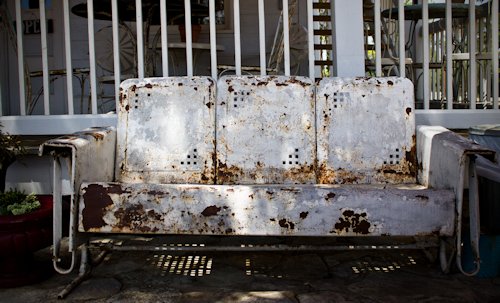 When I eat breakfast at the kitchen table, I see a Ziploc full of something crumbly and gray that looks like pot. My eleven-year-old son explains: “These are mouse bones and a mouse skull.” He removes them, places before me a tiny criss cross pile of miniature sticks so delicate I don’t dare touch them. But I do. The teeth are periods packed tight inside the sharp jaw like a zipper. Femurs are drumsticks for gnats. Inside the skull Georgia O’Keefe swoons. We marvel at the durability of bones.
When I eat breakfast at the kitchen table, I see a Ziploc full of something crumbly and gray that looks like pot. My eleven-year-old son explains: “These are mouse bones and a mouse skull.” He removes them, places before me a tiny criss cross pile of miniature sticks so delicate I don’t dare touch them. But I do. The teeth are periods packed tight inside the sharp jaw like a zipper. Femurs are drumsticks for gnats. Inside the skull Georgia O’Keefe swoons. We marvel at the durability of bones.
*
I keep my mother’s white satin wedding shoes on a bookshelf in my study. Inside they say “QualiCraft” on a pink leather footbed. The toe box is pointed sharp as a fresh pencil tip. They fit me, just, though walking in them proves impossible without pain. I imagine my mother wincing up the papered aisle, toes pointed piously towards the blonde Lutheran cross ahead. Back in my hearty black sandals, my feet settle softly, spread out with all the room they need.
*
My husband and I fought once, terribly, in our dining room. It was winter’s limp end— snowbanks slouched outside the window, the children pressed between plaid flannel. I used the “f” word and he cut the heart out of me by insulting my writing. Infrequent fighters, we struggled to perform. I cried, ran out the front door and down the street to our town’s vintage movie theatre where I promptly fell asleep in the back row. It was a comedy.
*
I sit on the front porch reading a book of prose poems. “I rose from the dead just to see what’s for dinner.” The way the sunlight hits the grass reminds me of Ella Fenske, an old lady who lived next to my grandparents in Minnesota. Her entire yard was devoted to potato gardens, front and back. She wore plaid zip up housedresses and hobbled in sturdy brown shoes. For birthdays, she gave us cards with two dollars inside, and signed them, “Neighbor Ella Fenske, $2.00.” She didn’t want us to forget.
*
The traditional gift for the twentieth wedding anniversary is china. We order takeout: fried wontons, Hunan shrimp, five-spice tofu, plain lo mein (for the kids), honey chicken (for the kids). Our champagne flutes rattle on the glass patio table as cars cruise past. The kids drink tumblers of milk and attempt to photograph us but the sun proves too bright for clarity. Our daughter eats her fortune cookie but hands the wrinkled fortune over to us: “Well done is better than well said.”
*
My grandfather wore flannel shirts softened limp by Downy, read National Geographics with a magnifying glass, and made butter for a living. My grandmother grew fat red tomatoes, wore navy pointed Keds, and let God decide. Their daughter, my mother, married a man she shouldn’t have whose Buddy Holly glasses masked greater troubles ahead. They tried to warn her but reckless won. My mother grew gaunt, her collarbones so fragile and fine it seemed possible they could snap at any moment.
*
My husband pulls up in the Mazda and finds me by candlelight on the porch. Next door a neighbor rumbles his trash bin to the curb. Two young women bike by on fat tires, slow, helmetless, talking easy and quiet. “It’s summer,” my husband says, “and yet, not quite.” We talk for a long time about our trip to Quebec City, the new burrito place down the street, our son’s loose tooth and does he really still believe in the tooth fairy? “There’s a chance,” I say. Our dog barks once at a squirrel then lies hounded at our feet. We both squint down the street to see what happens next.
—
Anne Panning is the author of two short story collections, as well as the novel Butter. She has won The Flannery O’Connor Award for Short Fiction, and is currently at work on a memoir,Dragonfly Notes: A Memoir of Motherhood and Loss. She teaches creative writing at SUNY-Brockport.
Photography by Michael McKniff

11 comments
angela says:
Mar 13, 2013
I love this.
Eliana says:
Mar 14, 2013
What Angela said. All that 20 years holds.
Heidi says:
Mar 14, 2013
Thank you for sharing, Maggie! Lovely. Simply…lovely.
Caroline says:
Mar 20, 2013
Awe inspiring! Really lovely!
Jake Carlsen says:
Mar 21, 2013
“We both squint down the street to see what happens next.” Lovely. I can’t stop reading this over and over. This is fantastic, Anne.
Melanie says:
Mar 23, 2013
Just an honor to read thanks anne
susanna young says:
Mar 23, 2013
This is so wonderful to read for its desperate sequence of moments. I think somehow this makes them feel human, rather than absurd.
Mary Collins says:
Mar 28, 2013
So full of exquisite echoes and hints at stories within stories, and yet so complete in itself, too. I am eager to read Dragonfly Notes.
Ping says:
Apr 4, 2013
There are many meaningful sentences in this essay. I like it.
Kate Kysar says:
Apr 9, 2014
Lovely and evocative!
Dino says:
Apr 13, 2014
I HEART this SO MUCH, Annie Fannie Funny Face, my sweet, dear longtime friend.